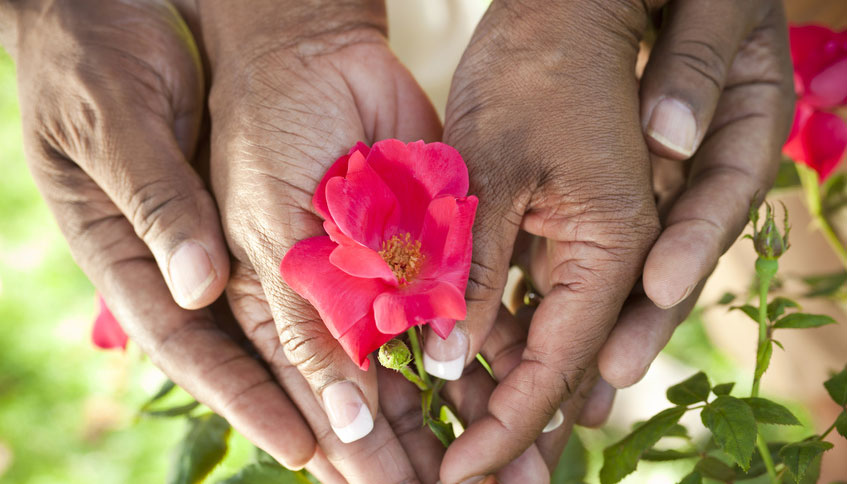Marsha Raines & Associates, LLC is now Aging Well Rochester
Our Monthly Newsletter
with helpful tips for family caregivers
September/October 2016 Print
The importance of touch
 It is said that touch is our “first language.” As babies, it is through touch that we learn connection, trust, and well-being.
It is said that touch is our “first language.” As babies, it is through touch that we learn connection, trust, and well-being.
Not just for children. Touch is integral to these feelings throughout our lifespan. But older adults have roughly 75% fewer touch receptors than 20-year-olds. In a twist of fate, when we literally need more touch to “feel” the benefits, we have fewer opportunities for it. Spouses die. Children and grandchildren live far away. No wonder pets become so important!
The healing power of touch. Although touch is strongly associated with emotions, studies show that massage, nonsexual affection, and even an informal hand on the shoulder can provide physical benefits.
- A warm touch releases oxytocin, the bonding hormone. It also reduces levels of cortisol, the stress hormone.
- Cancer patients who received massages from family members reported a 34% decrease in pain. They also reported a 29% decrease in nausea. (Family members reported benefits too!)
- In dementia care, long-term care facilities are able to reduce aggressive behaviors when staff members regularly hold hands with residents or touch them on the arm when talking.
Ways to offer more touch.
- Walking arm-in-arm or occasional touching of the forearm or shoulders.
- Offering your hand or inviting touch in the form of a handshake.
- This fun way of interacting provides many opportunities for safe, nonthreatening touch.
- Applying lotion to the hands and arms. Can you ever have too much moisturizer?
- Giving a nice rubdown during a shower or afterwards when drying off.
- Adopting a dog or cat. These furry companions provide endless opportunities for physical affirmation.
Provide a sense of control. Especially in the case of dementia, make sure the person you care for can see that a gesture of touch is about to happen. Get eye contact and look for signs that touching may not be welcome.
Return to topHow to report symptoms
to the doctor
 All healing begins with an accurate diagnosis, yet errors are common. So common that most of us are likely to experience at least one diagnostic error in our lifetime. The Institute of Medicine reports that diagnostic errors play a role in 10% of all deaths.
All healing begins with an accurate diagnosis, yet errors are common. So common that most of us are likely to experience at least one diagnostic error in our lifetime. The Institute of Medicine reports that diagnostic errors play a role in 10% of all deaths.
How we describe symptoms to the doctor can go a long way in helping the doctor make an accurate diagnosis.
Doctors are taught to look for eight characteristics in a symptom. Help the doctor zero in on what’s wrong with your loved one by considering these eight questions:
- Where is the pain (or other symptom)?
- What is the symptom like? Describe its qualities. Does it feel dull? Fiery? Sharp? Tingly? Does it radiate from one spot to another?
- How severe is the pain (or other sensation)? What is it at its worst? (On a scale of 1 to 10, with 10 being the most intense.) At its best? Right now (the moment of the appointment)?
- When did the symptom first occur? Does it come and go? If so, how often? How long does each episode last?
- What do you think caused the symptom to start? What was going on when it began? Any specific movement or activity? Was there an accident? A new medication? New shoes or new chair? Upsetting life event?
- What makes it better? Heat? Cold? Lying down? Is it better in the morning? Later in the day?
- What makes it worse? Eating? Riding in the car? Is it affected by any specific activity?
- Are there other symptoms too? Such as nausea or dizziness? Trouble breathing? Fatigue?
By providing information about these eight factors, you are helping the doctor arrive at the right diagnosis in the shortest amount of time.
Return to topWhat is a bedsore?
If you are caring for a frail elder or someone who is largely immobile (in bed or a wheelchair), be on the lookout for bedsores.
Bedsores usually appear on bony parts of the body when a person is unable to turn, lift, or shift him- or herself. First, the skin just seems to be red. But the red does not go away. Left untended, the skin can break open. The break can deepen and become infected. Oddly enough, the person with the bedsore may not even be aware that it’s there.
Bedsores develop quickly, yet take a long time to heal. Prevention and early detection are key.
- Examine the skin daily, especially bony areas. Look at the hips, heels, ankles, shoulders, elbows, tailbone, and back of the head. For those in a wheelchair, look at the buttocks and bottoms of the feet. Talk to a medical professional if the skin looks red, feels warm, or if your loved one says it burns, hurts, or itches.
- Reposition every two hours in bed. Rotate your loved one to put weight on different areas: first lying on one side, then the back, then the other side. Use pillows to cushion bony areas, such as knees and ankles.
- Help the person shift weight every 15-30 minutes in a wheelchair. Move out of the wheelchair, to a recliner or to bed, after two hours.
- Provide padding. Use a foam or gel cushioning in chairs and bed. Or an alternating air cushion. Medical supply stores carry these and other protective products, such as heel covers.
- Keep the skin dry. And clean. This is especially important with incontinence. Change clothes and bedding frequently. Talcum powder may be helpful.
- Provide a good diet and plenty of water. Skin health and healing requires protein, vitamins, and minerals, with adequate calories and fluids.
